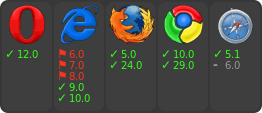StackGenVis: Alignment of Data, Algorithms, and Models for Stacking Ensemble Learning Using Performance Metrics
https://doi.org/10.1109/TVCG.2020.3030352
You can not select more than 25 topics
Topics must start with a letter or number, can include dashes ('-') and can be up to 35 characters long.
|
|
5 years ago | |
|---|---|---|
| .. | ||
| example | 5 years ago | |
| test | 5 years ago | |
| .travis.yml | 5 years ago | |
| LICENSE | 5 years ago | |
| index.js | 5 years ago | |
| package.json | 5 years ago | |
| readme.markdown | 5 years ago | |
readme.markdown
minimist
parse argument options
This module is the guts of optimist's argument parser without all the fanciful decoration.
example
var argv = require('minimist')(process.argv.slice(2));
console.dir(argv);
$ node example/parse.js -a beep -b boop
{ _: [], a: 'beep', b: 'boop' }
$ node example/parse.js -x 3 -y 4 -n5 -abc --beep=boop foo bar baz
{ _: [ 'foo', 'bar', 'baz' ],
x: 3,
y: 4,
n: 5,
a: true,
b: true,
c: true,
beep: 'boop' }
methods
var parseArgs = require('minimist')
var argv = parseArgs(args, opts={})
Return an argument object argv populated with the array arguments from args.
argv._ contains all the arguments that didn't have an option associated with
them.
Numeric-looking arguments will be returned as numbers unless opts.string or
opts.boolean is set for that argument name.
Any arguments after '--' will not be parsed and will end up in argv._.
options can be:
opts.string- a string or array of strings argument names to always treat as stringsopts.boolean- a string or array of strings to always treat as booleansopts.alias- an object mapping string names to strings or arrays of string argument names to use as aliasesopts.default- an object mapping string argument names to default values
install
With npm do:
npm install minimist
license
MIT

